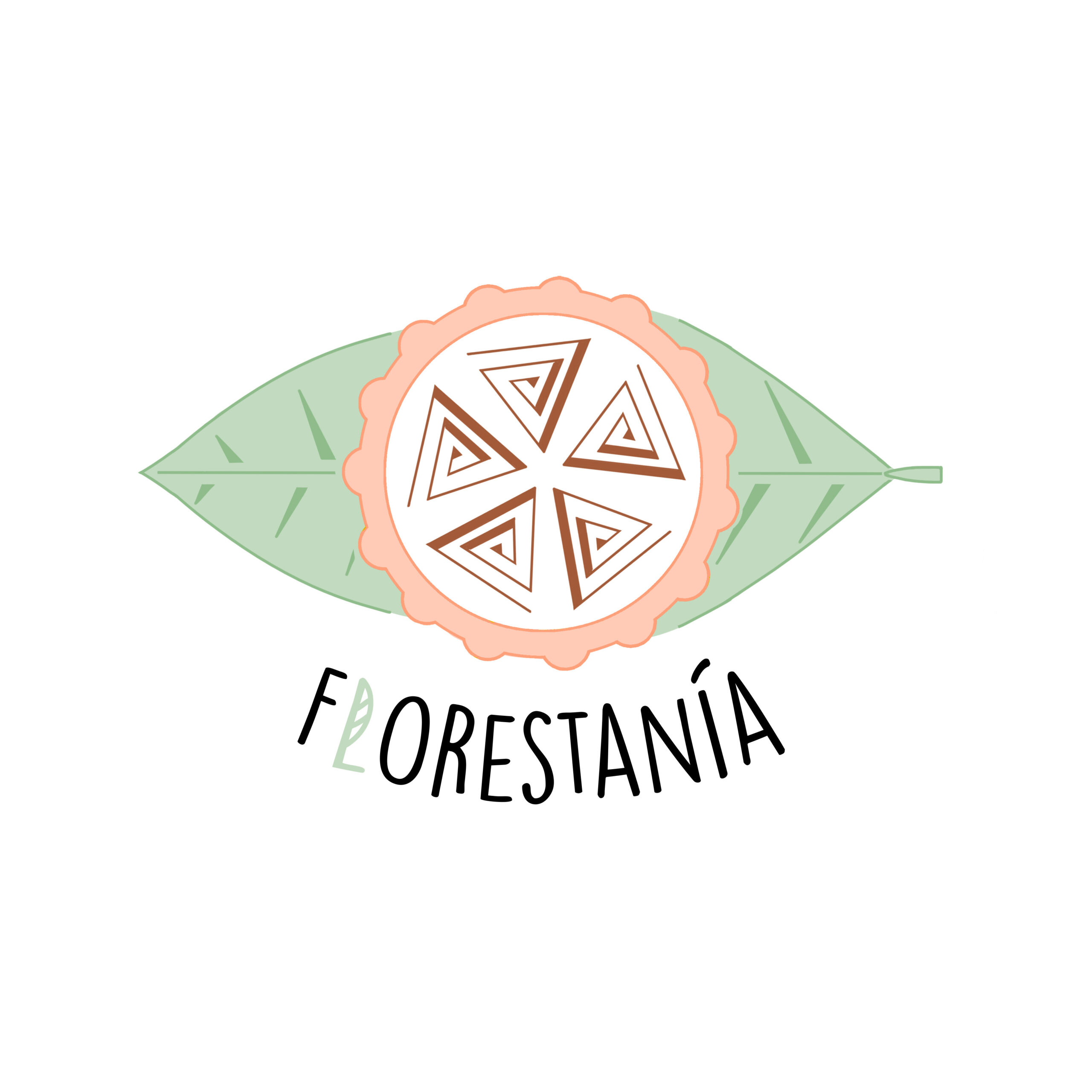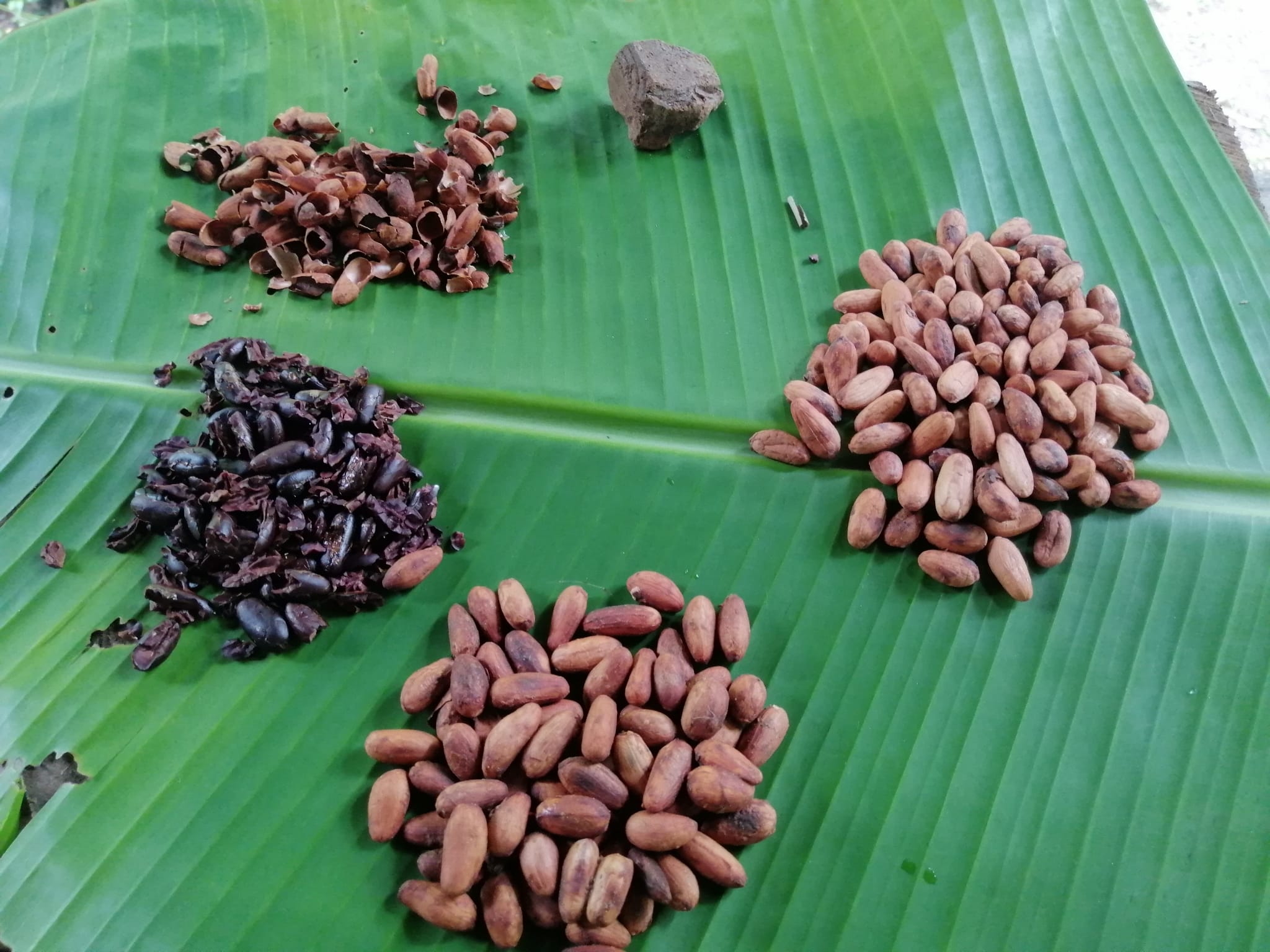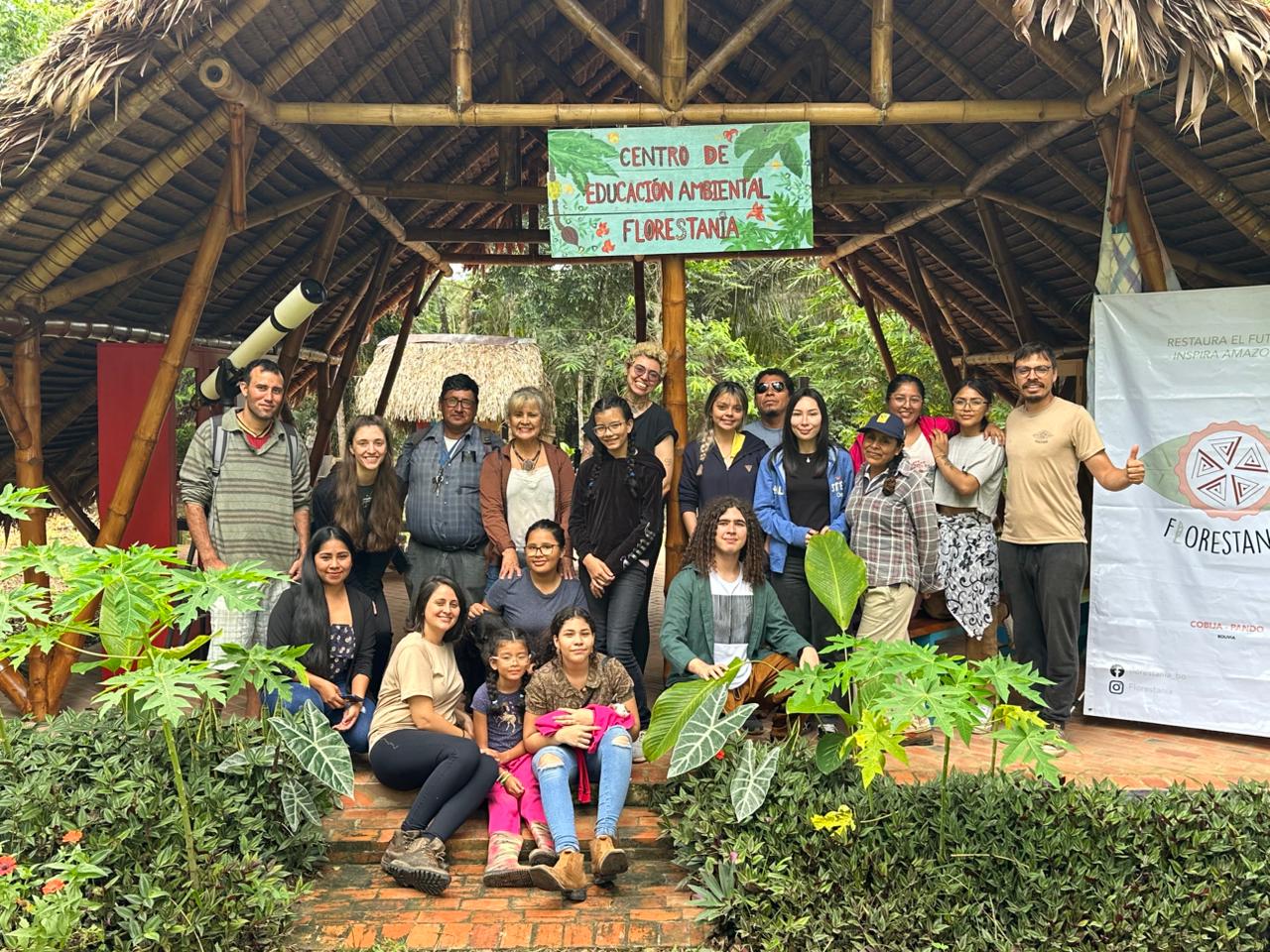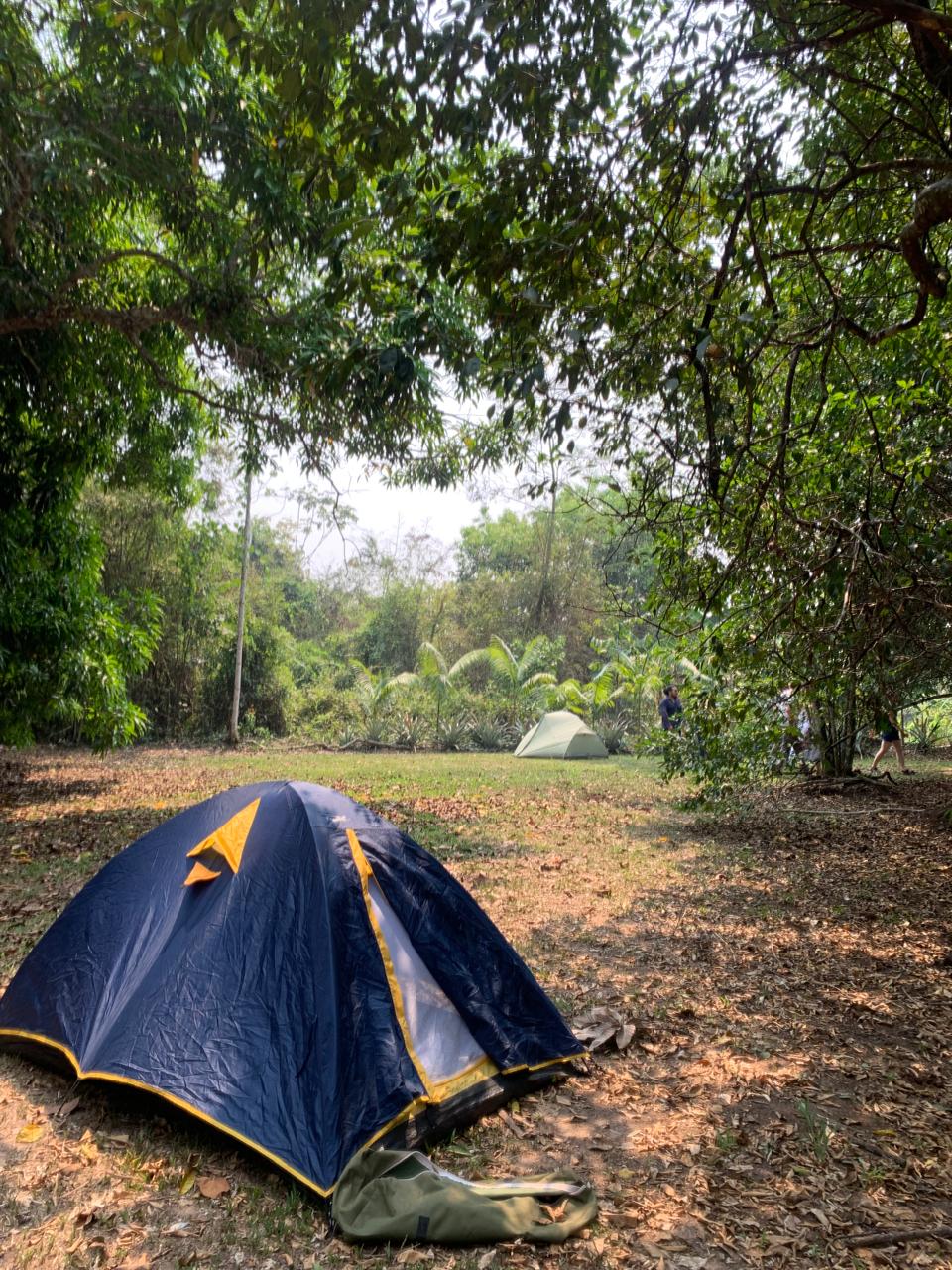Florestanía is much more than a word: it is a way of life in harmony with the forest. Born from the fusion of floresta (forest) and ciudadanía (citizenship), it was created by Brazilian poet Antonio Alves and popularized by the iconic Amazonian leader Chico Mendes. Florestanía represents the concept of forest citizenship, which values nature, culture, and human dignity in the heart of the Amazon. Since 2015, Florestanía has been working for forest regeneration and environmental education, strategically located at the intersection of urban and rural areas of Cobija in the Bolivian Amazon, focusing its work on community capacity building and regenerative and sustainable land management to address urgent local social and environmental challenges, particularly food security and climate change. Every year, people from all over the world come to Florestanía seeking to reconnect with nature, learn, and put their hands to work for a better future. Through virtual platforms, volunteers join in to collaborate on activities such as reforestation, agroforestry system care, and building with natural materials. In return, they receive practical training and transformative experiences in the Amazon rainforest.
Country: Bolivia,
When did this experience begin?: 15/11/2015
At what stage is the experience currently?: It's a consolidated. established experience
Is the experience legally recognized?: Yes
Where does the experience take place?:
Name of the organization leading the experience: Asociación Civil sin fines de Lucro Florestanía
Year in which it was established: 19/06/2024
Acronym (initials) of the organization:
Logo of the organization: 
Description of the Organization: The non-profit civil association Florestanía began its journey in 2015. Currently, Florestanía's board of directors has nine members, who are men and women of different ages, ranging from 25 to 85. The financial resources for project development come from the association itself, donations, and foundations or NGOs that support specific actions. Florestanía's mission is to be a leader in environmental education, sustainability, and regenerative agriculture for the recovery of degraded soils in the Bolivian Amazon, raising awareness about the importance of preserving the rainforest in the face of climate change and for global food security. Florestanía's vision is to create a green area at the intersection of the urban and rural areas of Cobija with a focus on environmental education, productive reforestation, and ecological tourism, serving as a pilot demonstration for implementation in larger areas of the Amazon.
Address of the organization's headquarters: Bajo Virtudes, calle sin nombre. Cobija, Pando, Bolivia.
Florestanía contributes to socio-environmental justice and good living by promoting collective processes of environmental recovery, cultural strengthening, and community education in historically marginalized Amazonian territories. Our approach combines scientific knowledge with ancestral wisdom, recognizing the rights of nature and local communities to live with dignity, in harmony with their environment. We are committed to regenerative practices that not only restore ecosystems, but also social, territorial, and spiritual bonds, which are fundamental for building a more just and sustainable future in balance with life.
Context: Cobija, capital of the Bolivian department of Pando, is experiencing rapid population growth, which has led to significant social inequalities, such as a high poverty rate of 30%, child malnutrition of 21% (which means a high mortality rate for children under five) and a staggering unemployment rate of 60%, with most of the work being informal. This culminates in widening gender gaps in education, employment, and social development. The rural area of Cobija corresponds to a district with 15 communities and its forest area, where rubber extraction, chestnut and asaí harvesting were traditionally carried out, is being rapidly replaced by activities with a high environmental impact, such as agriculture and livestock farming, accompanied by logging (often illegal) and the burning of vegetation to "prepare" the area for crops, promoting soil degradation. Due to the difficulty of access by road (mainly during the rainy season), rural communities do not have a regular solid waste collection service, so most people burn their waste or dispose of it in a corner of their property or on the side of the road, causing pollution and unsanitary conditions. Florestanía carries out its activities at the intersection between the urban and rural areas (Bajo Virtudes community) of Cobija. The site covers 5 hectares, of which 1.8 are already undergoing regeneration with agroforestry systems and 3.2 are predominantly covered with secondary species (trees, shrubs) with short life cycles and some areas of Sapé grass (Imperata brasiliensis), indicating the degraded state of the soil as it was previously used for agriculture and livestock. To the northwest, the land is connected to larger areas of more mature forest (with climax species), while to the north there are areas used for agriculture and livestock, which are increasingly replacing forest areas, reducing the natural areas that do not have a plan to maintain ecological corridors for wildlife. To the east and southwest, the area suffers from urban pressure, marked mainly by the irregular disposal of inorganic solid waste and dead animal remains, pollution of streams, disorderly occupation of dwellings, most of which lack basic sanitation and other urban services (drinking water, regular solid waste collection), and some of which are even located in areas designated as urban green spaces, in addition to frequent burning during the dry season.
![]()
Social Issues:
Public healthOther - Which one?
Other - Which one?: Casas sin saneamiento básico, agua o electricidad en el barrio vecino.
![]()
Cultural Issues:
Loss of cultural identityImposition of external modelsDeterioration of cultural heritage
![]()
Political Issues:
Absence of public institutionsLack of recognition of traditional authoritiesCorruptionConflictos de soberanía nacional
![]()
Economic Issues:
MonocultivantsLivestock FarmingWildlife TraffickingIllegal EconomiesDrug Trafficking
![]()
Environmental Issues:
PollutionDeforestationDegradationDroughtsFloodsDeterioration of water sourcesClimate changeForest firesDestruction of ecosystems
| Title | Unit | Number | Description |
|---|---|---|---|
| Árboles nativos sembrados desde 2016 | Trees | 1500 | Every year, we plant more than 100 native trees in areas of recovering forest, such as mara, cacao, copaiba, oak... |
| Materia organica procesada por año | Tons | 90 | At Florestanía, we manage our organic waste and also receive waste from chestnut processing companies, which was the main organic input used to begin soil recovery at the site. |
| Manual de concepción y elaboración de baño ecológico seco. | Manual produced | 1 | The manual teaches how to build an ecological dry toilet using bamboo and mud for the walls. It also teaches how to use the toilet and manage waste (urine and feces) in an ecological manner that is safe for human health and the environment. Available free online: https://books.google.com.br/books?id=7tzzEAAAQBAJ&lpg=PA1&hl=pt-BR&pg=PA1#v=onepage&q&f=false |
| Voluntarios recibidos | People | 130 | Volunteers who come from other countries to collaborate with Florestania's activities. |
| Visitantes en el Centro de Educación Ambiental Florestanía | People | 380 | Visits to the Environmental Education Center have been recorded since 2023. |
| Talleres realizados en el Centro de Educación Ambiental Florestanía | Numbers | 35 | Workshops held from October 2023 to June 2025 free of charge. |
| Certificados de reconocimiento | Certificates | 2 | The Autonomous Departmental Government of Pando has awarded Florestanía two certificates, one for its work in biodiversity conservation and the other for promoting ecotourism. |
| Hectáreas de pasto recuperadas | Hectares | 2 | For many years, this area was impacted by livestock farming and fire. In 2015, Florestanía began developing regenerative agroforestry systems, and today the area produces 3.2 tons of food per hectare. |

Nibs de cacao 80g
Agroforestry and agroecological cocoa nibs grown in Florestanía.
70 Bolivianos
Té de cacao 100 g
Cocoa bean shells after roasting, they have a chocolate aroma and flavor and are perfect for infusions.
35 Bolivianos

Talleres de Educación Ambiental
The workshop topics are diverse and the language is adapted to the audience.

Pernocte en camping
Stay at Florestanía campsite and experience sleeping to the sounds of the jungle and under a sky full of stars. Contact us to find out more about our food service featuring local products!
Tour guiado en Florestanía
Visit the project, the agroforestry systems, learn about our solid waste management and the ecological toilet! Finally, enjoy a walk along our interpretive trail to awaken your senses in the jungle and leave feeling refreshed!
Partners or Allied Organizations
| Organization Name | Organization Role in the Experience |
|---|---|
| Pastoral Social Caritas Departamento de Pando | Aliada |
| Fundación Socioambiental Semilla | Financiadora |